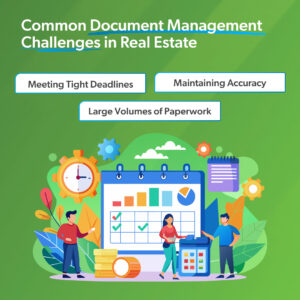
Effective document management is essential for success in the fast-paced world of real estate. From contracts and disclosures to lease agreements and financial records, real estate professionals handle a large volume of paperwork daily. Without a structured system in place, it’s easy to lose track of important documents, leading to errors, delays, and compliance issues.
In this article, we’ll explore top tips for efficiently managing real estate documents, leveraging technology, and staying organized to ensure smoother transactions, better client service, and reduced stress. Whether you’re a broker, agent, or transaction coordinator, these tips can help streamline your document management process.
Why Is Document Management Important?
Document management is critical in real estate because it helps professionals stay organized, reduce errors, and ensure compliance with legal and regulatory requirements. With numerous contracts, agreements, and financial documents to handle, maintaining an efficient system prevents delays and miscommunication. Effective document management also protects sensitive client information and supports smooth transactions, leading to better client satisfaction, improved collaboration, and increased productivity for real estate professionals and teams.
Common Document Management Challenges in Real Estate
Real estate professionals face several challenges when managing documents, including handling large volumes of paperwork, maintaining accuracy, and meeting tight deadlines. Ensuring documents are securely stored and easily accessible, especially for remote teams, adds complexity. These challenges can lead to errors, delays, and compliance risks.
Handling Large Volumes of Documents
Real estate transactions involve a significant amount of paperwork, from contracts to disclosures. Managing these large volumes of documents can quickly become overwhelming, leading to disorganization and misplacement. Without a proper system, it’s easy for important files to be lost or misplaced, which can slow down transactions and cause unnecessary delays.
Maintaining Version Accuracy
With multiple parties reviewing and editing documents, version control becomes a critical challenge during the closing process. It’s essential to track changes and ensure all parties are working from the most up-to-date version. Failure to maintain version accuracy can result in errors, miscommunication, and even legal issues, complicating the sale.
Meeting Tight Deadlines
Real estate transactions often operate on strict timelines, and missing a deadline can jeopardize deals. Managing multiple tasks, approvals, and documents while meeting these deadlines is a major challenge. Without an efficient system in place, it’s easy for critical dates to slip through the cracks, potentially leading to costly delays.
Ensuring Remote Accessibility
With real estate agents and brokers often working from various locations, ensuring remote access to important documents is crucial. Without a centralized, cloud-based system, managing documents remotely can lead to delays and inefficiencies. Limited accessibility to files can slow down transactions, prevent timely collaboration, and create difficulties when documents need to be reviewed or signed on the go.
Managing Sensitive Information Securely
Real estate transactions involve handling sensitive client information, including financial details and personal data. Ensuring this information is stored securely is a major challenge, especially with cyber threats and data breaches becoming more common. Without proper security measures in place, such as encryption and restricted access, there’s a risk of unauthorized access or data leaks, which can lead to legal consequences and loss of trust.
What Is the Best Way to Organize Real Estate Documents?
Maintaining a well-organized system for managing real estate documents is essential for keeping contracts, agreements, and records accessible, secure, and error-free. A thoughtful approach not only streamlines workflows but also enhances collaboration, reduces mistakes, and saves time. By following key strategies for organizing paperwork, real estate professionals can ensure smoother transactions and better client service.
Categorize by Transaction Type
Organizing documents by transaction type—such as purchases, leases, or listings—helps keep related paperwork grouped together and easy to find. This method simplifies the process of tracking all necessary documents for a specific transaction, ensuring nothing is overlooked. It also streamlines workflow, making it easier to locate and manage relevant files efficiently.
Implement a Filing System
A clear and consistent filing system is key to managing real estate documents. Whether physical or digital, an organized filing system allows quick access to important paperwork. Consistent file naming conventions, well-labeled folders, and subcategories ensure that documents are stored logically, reducing the chances of losing important documents and improving overall efficiency.
Organize by Date and Client
Organizing documents by both date and client allows for easier tracking of paperwork, ensuring that each transaction’s documents are in chronological order and tied to the appropriate client. This method provides quick access to historical data, enabling real estate professionals to stay on top of deadlines, client needs, and transaction updates efficiently.
Label Documents Clearly
Clear labeling is essential for maintaining an organized document system. Whether working with physical or digital files, consistent and descriptive labels make it easy to locate specific documents quickly. Properly labeled files help avoid confusion, reduce search time, and ensure that important paperwork is readily accessible when needed for real estate transactions.
Digitize Physical Paperwork
Using a real estate transaction management system to digitize physical paperwork helps eliminate clutter while improving access to important documents. Scanning and uploading physical files into a digital system not only secures them but also enables remote access, making it easier to manage transactions from anywhere.
Secure Important Documents
Securing important documents is crucial to protecting sensitive information and maintaining compliance. Whether using encryption for digital files or locking physical files in secure storage, safeguarding client data is essential in real estate. Proper security measures help prevent unauthorized access, ensuring that both client and transaction details remain confidential and protected.
Leveraging Technology for Document Management
Leveraging technology for document management allows real estate professionals to streamline workflows, reduce manual errors, and improve collaboration. Digital tools like real estate transaction management systems offer centralized document storage, automated workflows, and secure access from anywhere. By integrating technology, brokers and agents can manage large volumes of documents more efficiently, ensuring smoother transactions and enhanced client satisfaction.
 Using Real Estate Transaction Management Software
Using Real Estate Transaction Management Software
Real estate transaction management software centralizes all documents and tasks in one platform, making it easier to manage multiple transactions. It provides secure storage, real-time updates, and streamlined communication between team members and clients. By using such software, real estate professionals can improve efficiency, reduce paperwork, and keep every part of the transaction organized.
Automating Document Workflow
Automating document workflow using automated real estate transaction systems simplifies the process of creating, sharing, and approving documents. With automated systems, tasks like sending reminders, collecting signatures, and tracking document status happen seamlessly. This reduces manual work, minimizes the risk of errors, and speeds up the transaction process, allowing agents and brokers to focus on higher-priority tasks, like closing deals.
Implementing Digital Signatures
Digital signatures streamline the document approval process by allowing clients and stakeholders to sign electronically, eliminating the need for physical paperwork. This not only speeds up transactions but also provides enhanced security, as digital signatures are encrypted and traceable. Implementing digital signatures improves client convenience and helps real estate professionals close deals faster.
Real-Time Access to Documents
Having real-time access to documents is essential for keeping transactions on track and ensuring all parties stay informed. By utilizing cloud-based storage and transaction management systems, real estate professionals can access important paperwork anytime, anywhere. This immediate access allows for faster decision-making, better client service, and seamless collaboration with team members. With real-time updates, professionals can stay on top of transaction progress, quickly address issues, and ensure all documents are up to date.
Enhancing Security with Encryption
Protecting sensitive information is crucial in real estate, and encryption plays a key role in safeguarding documents. Encryption ensures that all digital files are securely stored and transferred, preventing unauthorized access. This enhanced security measure protects both client and transaction data, giving professionals and clients peace of mind. By implementing encryption by using transaction management tools for real estate, agents and brokers can comply with legal requirements, reduce the risk of data breaches, and maintain trust with their clients.
Schedule a Demo of Our Real Estate Transaction Management Platform
Are you ready to take control of your real estate document management and boost efficiency? Schedule a personalized demo of our real estate transaction management platform today! You’ll experience firsthand how it centralizes document storage, streamlines organization, and automates workflows, making it easier than ever to manage paperwork. With integrated digital signatures and real-time access, our platform simplifies every aspect of document management, reducing errors and improving collaboration.
Demos are available to Brokers and Association Executives looking to onboard 10+ agents, while individual agents and brokers with fewer than ten agents have access to live webinars. Contact us to schedule your demo and discover how you can keep every transaction on track.




